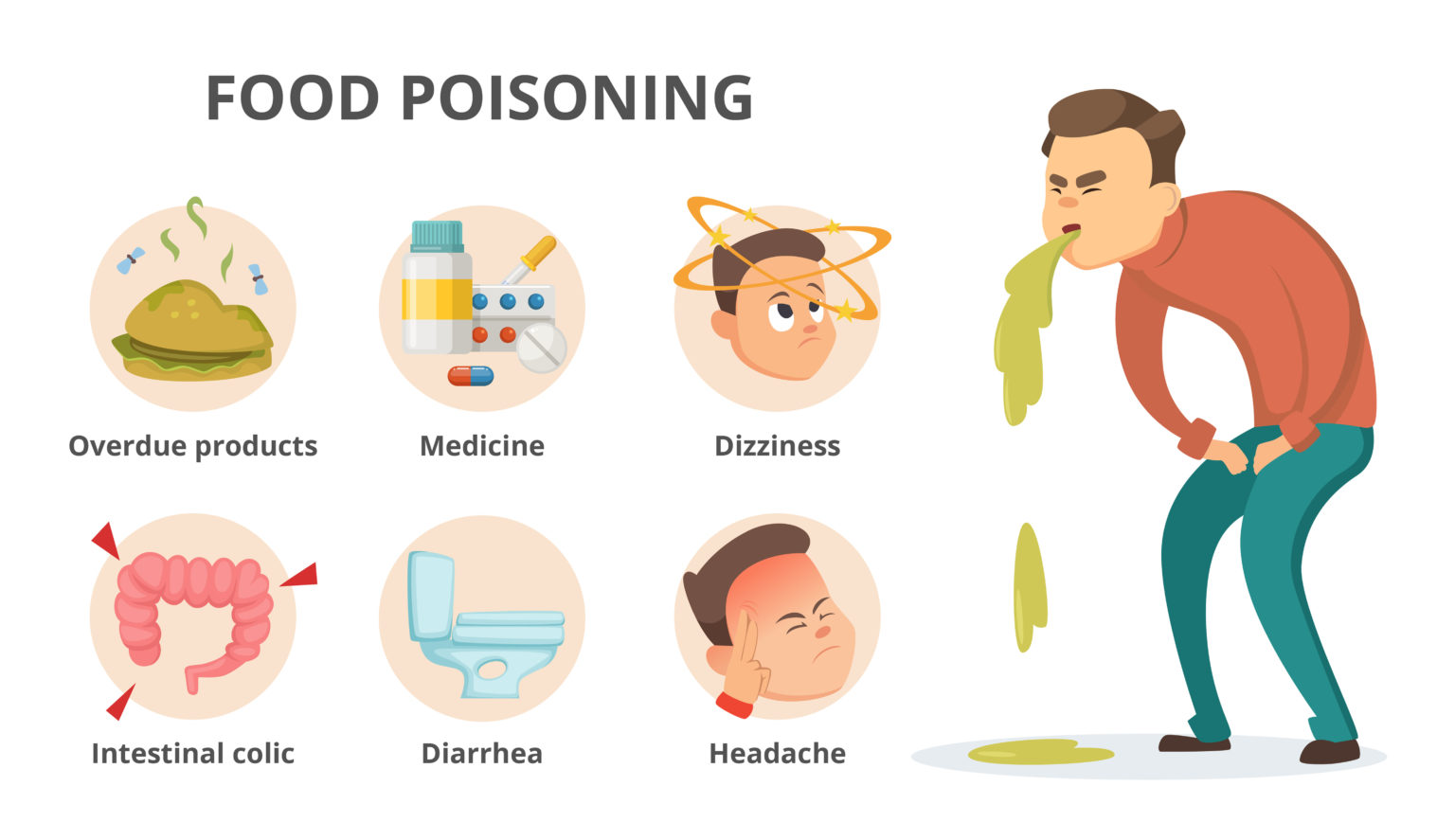Food Poisoning: Symptoms, Causes, Treatment
What are the symptoms of food poisoning?
Food poisoning, also known as foodborne illness, is caused by consuming contaminated food or beverages. The symptoms can vary depending on the type of contaminant and may include:
- Nausea: A feeling of discomfort or queasiness in the stomach, often accompanied by the urge to vomit.
- Vomiting: The forceful expulsion of stomach contents through the mouth, which may be caused by irritation or infection in the stomach or intestines.
- Diarrhea: Frequent, watery bowel movements that may be accompanied by stomach cramps, bloating, and gas.
- Abdominal pain: Cramping or discomfort in the abdomen, often centered around the stomach or intestines.
- Fever: An elevated body temperature, which may indicate an infection caused by bacteria or other pathogens.
- Weakness or fatigue: Feeling tired or weak, which may be due to dehydration or the body’s response to infection.
- Muscle aches: Pain or discomfort in the muscles, which may be a symptom of certain types of foodborne illnesses.
- Headache: A dull or throbbing pain in the head, which may be caused by dehydration or the body’s response to infection.
- Loss of appetite: A reduced desire to eat, which may be due to nausea, stomach pain, or other symptoms of food poisoning.
- Symptom onset: Symptoms of food poisoning typically begin within a few hours to a few days after consuming contaminated food or beverages.
It’s important to note that not all cases of food poisoning cause symptoms, and the severity of symptoms can vary widely depending on the individual and the type of contaminant involved. In severe cases, food poisoning can lead to dehydration, electrolyte imbalances, and other serious complications, so it’s important to seek medical attention from your healthcare provider if you suspect that you or someone else may have food poisoning.
What are the causes of food poisoning?
Food poisoning can be caused by a variety of pathogens, including bacteria, viruses, parasites, and toxins. Contamination can occur at any stage of food production, processing, or preparation. Some common causes of food poisoning include:
- Bacteria: Bacteria are a common cause of food poisoning and can multiply rapidly in food that is not properly stored or cooked. Common bacterial causes of food poisoning include Salmonella, Escherichia coli (E. coli), Campylobacter, and Listeria.
- Viruses: Viruses such as norovirus, hepatitis A, and rotavirus can cause food poisoning. These viruses are highly contagious and can be transmitted through contaminated food or water.
- Parasites: Parasites such as Giardia, Cryptosporidium, and Toxoplasma can contaminate food and cause food poisoning. These parasites are often found in contaminated water or undercooked meat, poultry, or seafood.
- Toxins: Toxins produced by bacteria such as Staphylococcus aureus and Clostridium botulinum can cause food poisoning. These toxins can be present in food that has been improperly stored or prepared.
- Chemicals: Chemicals such as pesticides, cleaning agents, and preservatives can contaminate food and cause food poisoning if ingested in high amounts.
- Allergens: Some people may experience food poisoning-like symptoms, such as nausea, vomiting, or diarrhea, due to an allergic reaction to certain foods. Common food allergens include peanuts, tree nuts, shellfish, and eggs.
It’s important to practice safe food handling and preparation techniques to reduce the risk of food poisoning. This includes washing hands and surfaces often, cooking food to safe temperatures, and storing food properly. If you suspect that you have food poisoning, it’s important to seek medical attention, especially if you experience severe or persistent symptoms.
What is the treatment for food poisoning?
Treatment for food poisoning depends on the cause and severity of the illness. In most cases, food poisoning resolves on its own within a few days and does not require medical treatment. However, in more severe cases or for certain types of food poisoning, medical treatment may be necessary. Treatment options may include:
- Fluid replacement: It’s important to avoid dehydration if you have food poisoning, especially if you are experiencing vomiting or diarrhea. Drinking clear fluids such as water, broth, or oral rehydration solutions can help prevent dehydration.
- Medications: In some cases, your healthcare provider may prescribe medications to help relieve symptoms such as nausea, vomiting, or diarrhea. However, these medications are not always recommended, as they can interfere with the body’s natural response to eliminate the toxin.
- Antibiotics: Antibiotics are not usually prescribed for food poisoning caused by bacteria, as the illness typically resolves on its own. However, in certain cases, such as severe or prolonged illness or for certain types of bacteria, antibiotics may be necessary.
- Hospitalization: In severe cases of food poisoning, hospitalization may be necessary, especially if you are unable to keep fluids down or if you are at risk of complications such as dehydration or organ damage.
- Avoiding certain foods: After recovering from food poisoning, it may be necessary to avoid certain foods that are more likely to cause illness, such as undercooked meat, poultry, or seafood, unpasteurized dairy products, and foods that have been left out at room temperature for an extended period.
It’s important to consult with a healthcare provider if you suspect that you have food poisoning, especially if you have severe or persistent symptoms. Your healthcare provider can help determine the cause of your illness and recommend appropriate treatment.




